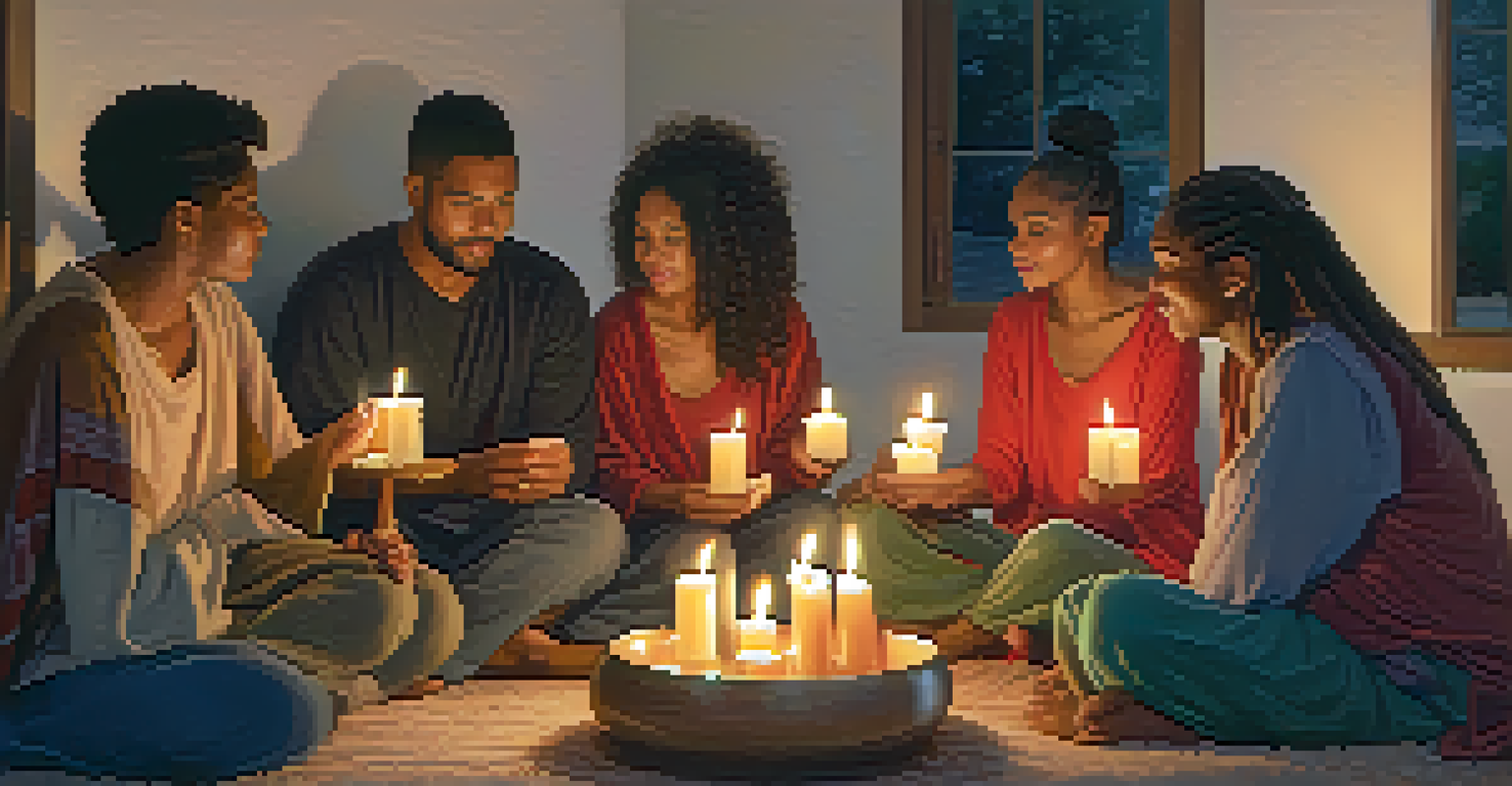Spirituality in Times of Crisis: A Source of Resilience

Understanding Spirituality and Its Role in Crises
Spirituality often serves as a guiding light during difficult times. It encompasses a broad range of beliefs and practices, making it a deeply personal journey for each individual. At its core, spirituality helps people find meaning and connection, which can be incredibly comforting in moments of uncertainty.
The wound is the place where the Light enters you.
During crises, whether personal or collective, turning to spirituality can provide a sense of stability. It allows individuals to reflect on their values, beliefs, and what truly matters to them. This introspection can foster resilience, helping people navigate the stormy waters of life with a clearer sense of purpose.
For many, spirituality is intertwined with community support. Engaging with others who share similar beliefs can create a comforting environment, reinforcing the idea that no one is alone in their struggles. This sense of belonging can be a powerful antidote to feelings of isolation that often accompany challenging times.
The Power of Mindfulness and Meditation
Mindfulness and meditation are practical spiritual practices that can greatly enhance resilience. These techniques help individuals stay grounded in the present, reducing anxiety about the future. By focusing on the here and now, people can cultivate a sense of peace, even amidst chaos.

For example, taking just a few minutes each day to meditate can create a mental buffer against stress. Breathing exercises and mindful awareness allow individuals to reset their emotional state, making it easier to tackle problems as they arise. This simple practice can serve as a vital tool in one’s spiritual toolkit.
Spirituality Provides Comfort in Crises
During difficult times, spirituality helps individuals find meaning and connection, fostering resilience.
Additionally, studies have shown that regular mindfulness practice can shift brain activity in ways that promote emotional regulation. This means that individuals who engage in mindfulness are often better equipped to handle crises with calm and clarity. It’s a win-win for both mental and spiritual health.
Finding Meaning in Suffering
One of the most profound aspects of spirituality is its ability to help individuals find meaning in suffering. This doesn’t mean that pain is desirable, but rather that it can lead to growth and understanding. Many people report that their toughest experiences have ultimately shaped their beliefs and values.
In the middle of difficulty lies opportunity.
For instance, Viktor Frankl, a Holocaust survivor and psychiatrist, emphasized the importance of finding purpose in the face of despair. His experiences led him to believe that even in the darkest times, individuals can find meaning, which can inspire resilience. This perspective can be transformative, allowing people to reframe their challenges.
By embracing the idea that suffering can lead to deeper insights, individuals can cultivate a spiritual resilience that empowers them. This shift in mindset—seeing challenges as opportunities for growth—can be a game-changer during difficult times.
Rituals and Their Comforting Influence
Rituals are a key component of many spiritual practices and can provide a comforting structure during crises. Whether it’s lighting a candle, praying, or participating in a community gathering, these rituals create a sense of continuity. They can ground individuals when everything else feels chaotic.
For example, many people find solace in daily rituals such as morning meditation or evening gratitude journaling. These small acts can foster a sense of normalcy and help individuals reconnect with their inner selves. They serve as reminders of hope and resilience amidst life’s unpredictability.
Mindfulness Enhances Emotional Resilience
Practices like mindfulness and meditation enable individuals to stay grounded, reducing anxiety and promoting calmness.
Moreover, rituals can strengthen community bonds, as shared practices often bring people together. This collective approach to spirituality can amplify feelings of support and belonging, which are crucial during challenging times.
The Role of Nature in Spiritual Resilience
Nature has long been regarded as a source of spiritual nourishment. Many people find themselves feeling more connected to something greater when surrounded by natural beauty. This connection can be a powerful source of strength during times of crisis.
Spending time outdoors offers a chance to reflect, recharge, and find peace. The sights, sounds, and smells of nature can evoke feelings of serenity and grounding, which help to alleviate stress. For many, a walk in the park or a hike in the woods can be an act of spiritual renewal.
Furthermore, nature often serves as a reminder of life’s cycles and resilience. Just as trees shed their leaves in winter but bloom again in spring, individuals can find hope in their own capacity for renewal. This understanding can inspire a sense of optimism, even in the face of hardship.
Personal Stories of Spiritual Resilience
Personal anecdotes can often illuminate the power of spirituality during crises. Many individuals have shared transformative experiences where spirituality played a key role in their healing journey. These stories can provide inspiration and hope for others facing similar challenges.
For instance, a cancer survivor might recount how her faith helped her cope with the emotional toll of her diagnosis. Through prayer, meditation, and community support, she found a renewed sense of purpose and strength. Such stories highlight the tangible benefits of spirituality in cultivating resilience.
Nature Inspires Hope and Renewal
Spending time in nature can evoke feelings of serenity and remind individuals of their capacity for renewal during hardships.
Hearing about others’ journeys can remind us that we are not alone in our struggles. These narratives often resonate deeply, encouraging individuals to explore their own spiritual paths as a means of finding strength during tough times.
Creating Your Own Spiritual Practices
Building a personal spiritual practice can be a rewarding way to foster resilience. This practice doesn’t need to be elaborate; it can be as simple as setting aside time for reflection or gratitude. The key is to find what resonates with you and makes you feel connected.
Consider incorporating elements that inspire you, whether it’s journaling, meditating, or spending time in nature. Experimenting with different practices can help you discover what brings you peace and clarity. Over time, these practices can become a vital part of your coping strategy during crises.

Remember, spirituality is a personal journey; there’s no right or wrong way to approach it. By prioritizing your spiritual well-being, you create a strong foundation that can support you through life’s inevitable challenges.